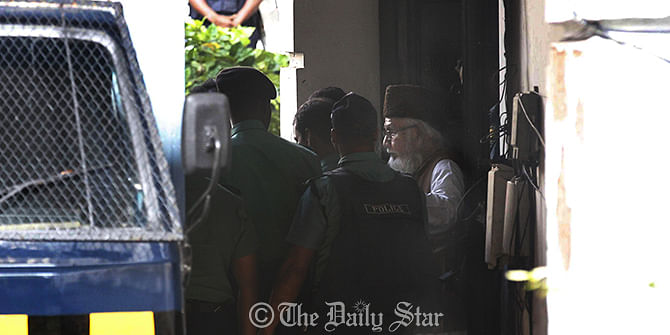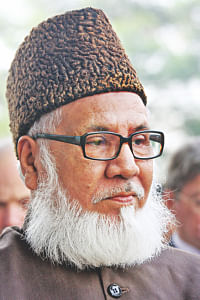Death for Nizami

A special tribunal in Dhaka today handed death penalty to Jamaat-e-Islami chief Motiur Rahman Nizami of four charges of war crimes, which include the killings of intellectuals at the fag end of the 1971 Liberation War.
The 71-year-old has also been awarded life sentence in four other charges as the International Crimes Tribunal-1 found him guilty in total eight out of 16 charges levelled against him in a historic trial that began almost 40 years after Bangladesh's war of independence.
The court said Nizami, though claimed to be an Islamic scholar, misinterpreted Quran to encourage his followers to conduct a massive genocide, advocate Haidar Ali, a member of the prosecution told journalists after the verdict.

Meantime, the defence termed the verdict "not based on evidence", and said it would appeal against the verdict with the Supreme Court.
"Whatever is being told against me is false," defence counsel Tajul Islam quoted the convict as saying in his reaction after the verdict.
Hailing the verdict, different social-cultural organisations including Gonojagoron Mancha brought out processions in the capital, Dhaka.
Nizami, Jamaat ameer since November 2000, has already been given death penalty in the sensational 10-truck arms haul case in January this year.
President of the then Jamaat student wing Islami Chhatra Sangha that turned into Pakistan army's infamous auxiliary force Al-Badr during the Liberation War, was arrested on June 29, 2010, in a criminal case and later shown arrest in war crimes cases.
With Nizami, six top Jamaat leaders have already been punished for their 1971 crimes. Two other top leaders are now being tried in war crimes tribunals the Awami League-led government formed in 2010 to bring the perpetrators of 1971 to book.
 Court sits amid tightened security
Court sits amid tightened security
Amid tightened security in and around the court premises, law enforcers took Nizami to ICT-1 premises around 9:20am.
Transport movement was halted from Doel Chattar to High Court Mazar area since the morning in a move to ward off any attempt to create violence by Jamaat, which fought tooth and nail against the birth of Bangladesh in 1971, and his associate bodies.
Five minutes after Nizami was produced before the tribunal, the judges took to the dais at 11:05am.
M Enayetur Rahim, chairman of the three-member judges' panel of the International Crimes Tribunal-1, delivered an introductory speech for five minutes on why the judgement was delayed.
He cited resignation of the tribunal chairman and the new chairman's going into retirement as key reasons for the delay in the much-awaited trial.
Later, Justice Anwarul Haque explained the 16 charges levelled against Nizami.
After he completed, the other judge of the panel, Justice Jahangir Hossain, started reading out summary of the 204-page verdict.
Justice Enayetur Rahim pronounced the order.
Earlier yesterday, Nizami was shifted from Kashimpur jail to Dhaka Central Jail around 8:00pm. There, jail doctors conducted a health check-up and found him sound, Farman Ali, senior jail super of Dhaka jail, told The Daily Star last night.
Longest of war trial
The ICT-1 framed 16 charges against Nizami on May 28, 2012. According to the charges, Nizami had conspired with the Pakistani army, planned and incited crimes; was complicit in murders, rapes, looting and destruction of property; and was responsible for commissioning of internationally recognised wartime crimes in 1971.
But, it took around one and a half years for the completion of the trial, thanks to the lack of preparation of the prosecution and a range of dilatory tactics of the defence.
The tribunal first kept the case awaiting verdict on November 13 last year. But the proceeding faced further delay when tribunal's chairman Justice ATM Fazle Kabir went on retirement without delivering the judgment. His successor reheard the closing arguments and kept the verdict waiting again on March 24.
The tribunal could not deliver verdict on June 24 due to Nizami's sudden "illness" forcing the court to keep it waiting again.
The Jamaat chief played a key role in forming the four-party alliance ahead of the 2001 election and led his party to taste state power along with their key ally the BNP.
He and Jamaat's second man, Ali Ahsan Mohammad Mojaheed, who was convicted in war crimes last year, became members of Khaleda Zia's cabinet, amid protests from the country's pro-liberation minds.
EU calls for commuting sentence
The European Union has called for commuting Nizami's death sentence and to introduce a moratorium on executions as a first step towards definitive abolition of capital punishment.
"The case of Motiur Rahman Nizami has now reached a stage where an execution of the death sentence constitutes a serious threat," said a statement of EU Delegation to Bangladesh.

 For all latest news, follow The Daily Star's Google News channel.
For all latest news, follow The Daily Star's Google News channel. 



Comments